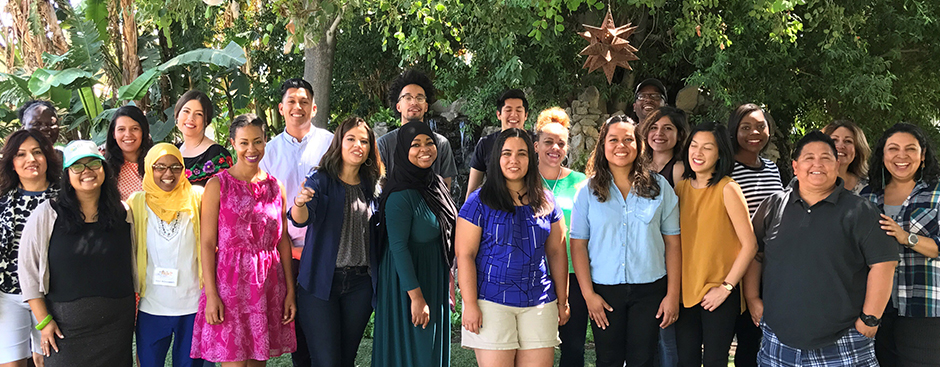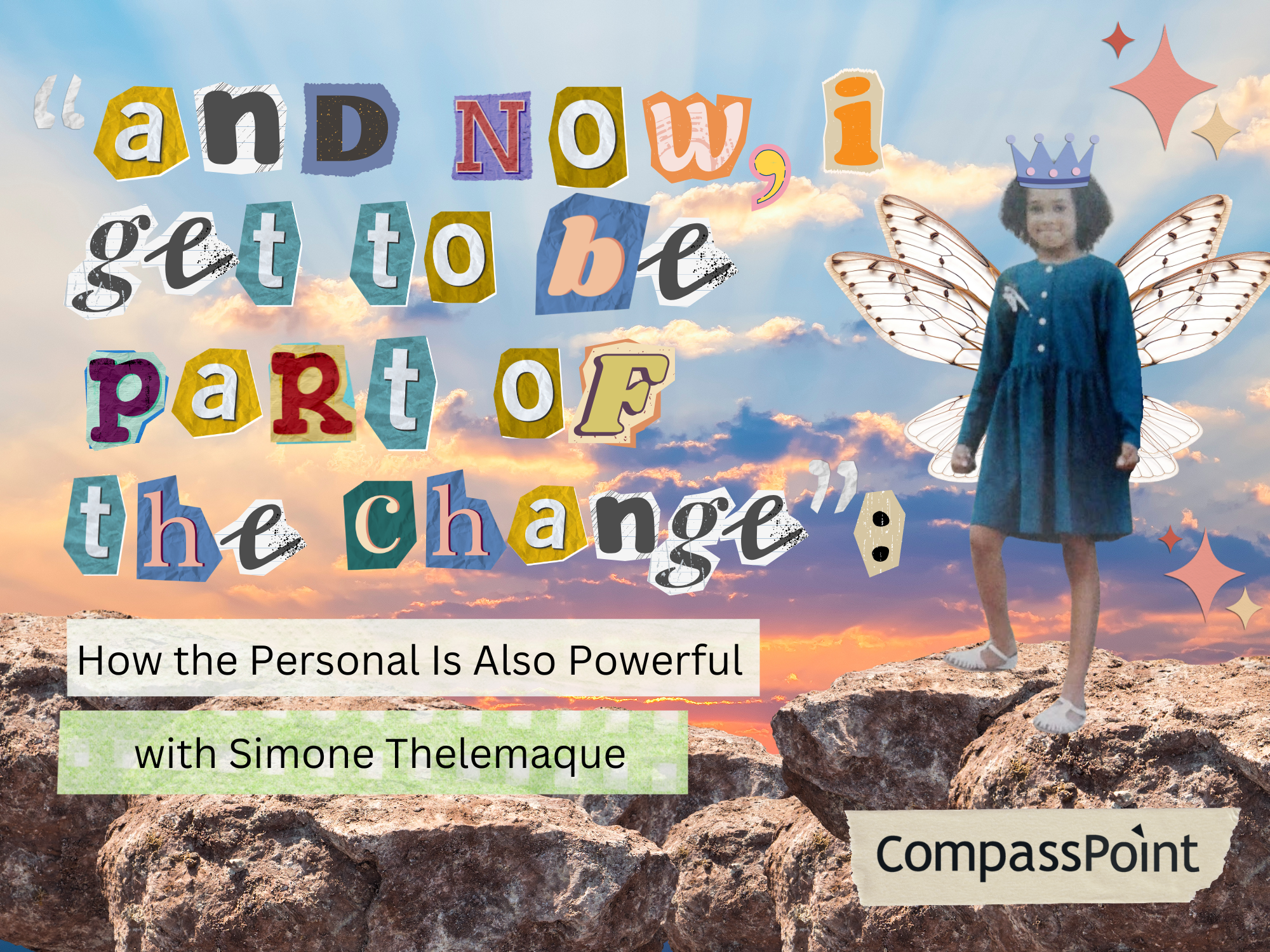In this guest blog, Elizabeth Ayala (Senior Program Associate at the Women's Foundation of California) explores what it's like to tackle negative internal scripts through one-on-one coaching with a certified coach. Elizabeth participated in CompassPoint's Next Generation Leaders of Color (Inland Region) leadership development program over the last year.
Coaching is an approach that's embedded across CompassPoint's practice. We have certified coaches on staff and also work with an extended network coaches working in the nonprofit and social justice space. Coaching is an essential cornerstone of our leadership development programs and many participants reflect on how transformational one-on-one coaching can be in getting 'un-stuck' from mindsets and patterns that hold them back and finding deeper purpose in their work. Learn more about coaching here. >

The Next Generation Leaders of Color Inland Region Cohort (2017-2018)
“Coaching is not mentoring, training, consulting or therapy. It is a powerful way to jump start transformational change.”
Who wouldn’t be intrigued by such a bold statement? I was watching a webinar as part of the Next Generation Leaders of Color Inland Region program, led by CompassPoint. The presenters (Kad and sujin) went on to share examples of goals for coaching and modeled a short session. I learned that it was possible to do an exploratory session or interview of sorts in search of a coaching fit.
The biggest insight shared was that I had to do reflection on what I wanted to get from working with a coach before I set out on my interviews. Like so much in life, you get what you put in.
So I immediately set about writing, jotting down notes that occurred to me about what I wanted to improve and the type of coach I wanted. Everything circled back to my desire to tackle the negative internal scripts that I faced in my professional life. I also decided that I wanted a coach that was supportive and would hold me accountable to the goals I set for myself.
After three interviews I settled on my coach, Cynthia. I felt a sense of ease with her style of listening and how she posed clarifying questions. She also shared an invitation to be creative in doing different exercises to explore and better understand my personal challenges.
Flowing Like a River
In one session, I shared how I was easily rattled by setbacks if they took place early on in my typical work day and how they would affect my motivation and focus. I gave specific examples and kept repeating, “I just want to keep moving” and “If only I didn’t get stuck…” Cynthia invited me to imagine what an alternative would look like; feel like. It occurred to me to picture a river, flowing with all that tumbled and swam through it. The messy first drafts and the awkward but brave conversations with colleagues, all flowing besides the well delivered training of that week.
The image was of life-giving water that flowed with fish, rocks, and drift wood. I felt silly, but she asked me to draw and write about the flowing river. This contemplative exercise was my homework and I sent it off to her the next day after our session. It was a powerful metaphor that I used to focus myself over the next week. When I felt bogged down by negative thoughts, instead of delaying my next task I’d forge ahead in an effort to let the “river flow on.” A few times I’d close my eyes and imagine seeing the Colorado River on a road trip or my last visit to a stream in my local mountains.
When Inner Voices Say "You're Not Enough"
In another session, I came back to my desire to tackle negative internal scripts. My goal for the series of coaching sessions I had was to develop practical steps to eliminate the voices that spoke to me saying that I was not enough. They were still there, nagging me. The work of liberation means directly discussing and confronting painful laws, practices, and cultures of oppression. That work is draining and bewildering and I felt that the negative internal scripts I carried made that load heavier.
Cynthia asked me, “How do these voices that say ‘You need to do better,’ ‘That was not good enough,’ ‘You can be perfect if you try harder,’ help you?”
I was taken aback. “They don’t help me, they hinder me,” I protested. They lead to fear, procrastination, and just feeling miserable. But Cynthia gently pressed on, asking me to consider the question: How do they help?
Well, they pushed me. They have always pushed me. Through honors classes in high school, to getting into a prestigious university as a first generation college student, through setbacks in my career trajectory, and now as a senior program associate at my current organization. They push, and push, and push me to keep going, do more, and try harder.
“So,” Cynthia continued, “What if you thanked them for what they are trying to tell you? What if your goal wasn’t to shut down this part of yourself? What would happen then?”
Finding a Different Way
I fell silent. My goal for coaching was to eliminate negative thinking. Her questions meant I would need to shift my goal. Instead, I would acknowledge those voices as a part of myself, take what was useful, and move on. I felt a sense of relief.
It has not been easy, but I have started to not get upset when negative scripts come up. Instead, I think, “What is my ambition telling me? When is it helping me and when can I just move aside?” In between coaching sessions, Cynthia checks in on how my practices are doing or sends articles that are thoughtful and encouraging. The most recent one came in as I was writing this; an invitation to accept the dual yearning to improve and do better and yearning to be proud of oneself.
For me, having a coach meant having an insightful and consistent thought partner in a concrete piece of my professional development. I’ve never felt shy about revealing my vulnerability especially if I felt it would be useful to a friend. But this is a reminder that reflecting on that vulnerability is useful for all parts of myself. The harsh thoughts I have about myself affect not just my “productivity” at work but how I see myself as a leader in my community, as a family member, and as a friend.
Of course my work is not done. But I have more tools to keep moving.
Elizabeth Ayala is a passionate community advocate and nonprofit professional dedicated to developing authentic and powerful grassroots leaders. She is a senior program associate at the Women’s Foundation of California where she manages the Women’s Policy Institute-Local fellowship. She enjoys singing in both English and Spanish, especially for fundraisers and at protests across the inland region of Southern California.
Resources:
CompassPoint Trainings:
Leadership That Works Trainings:





Submit a comment